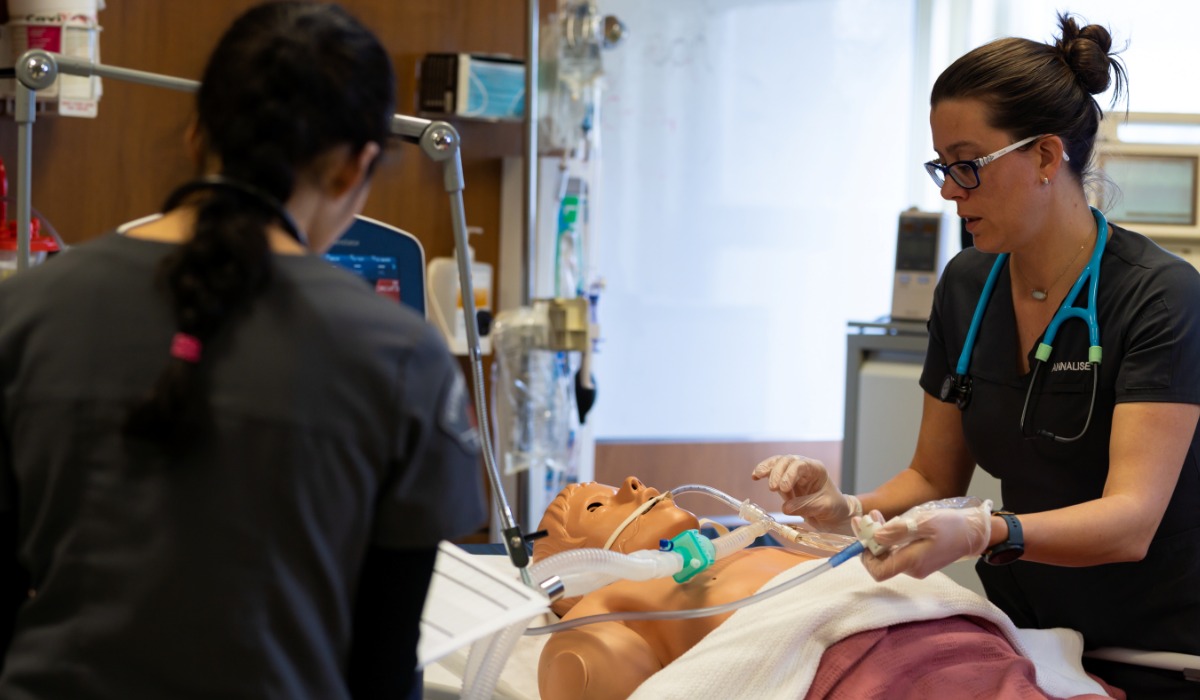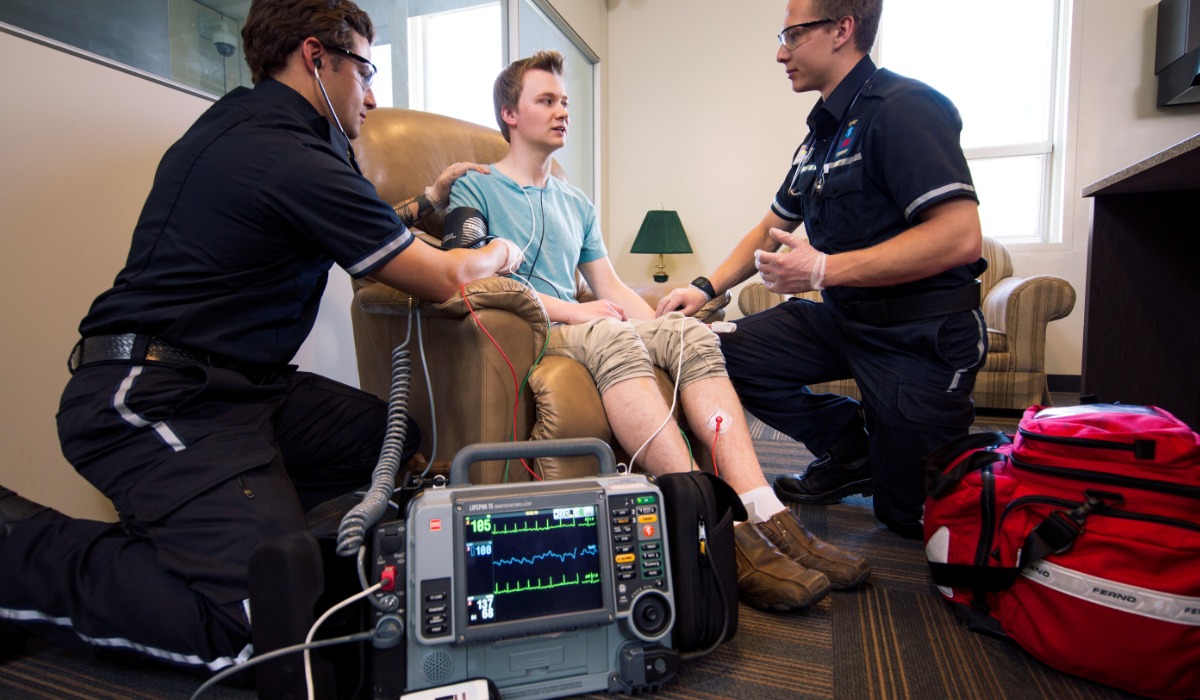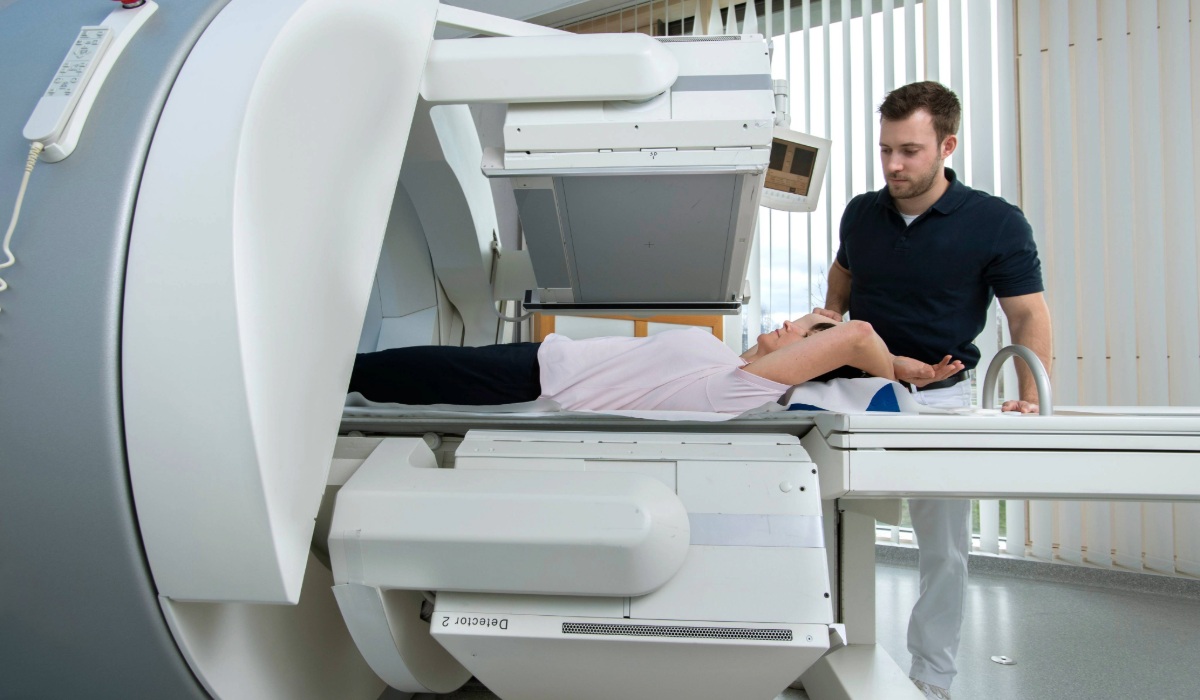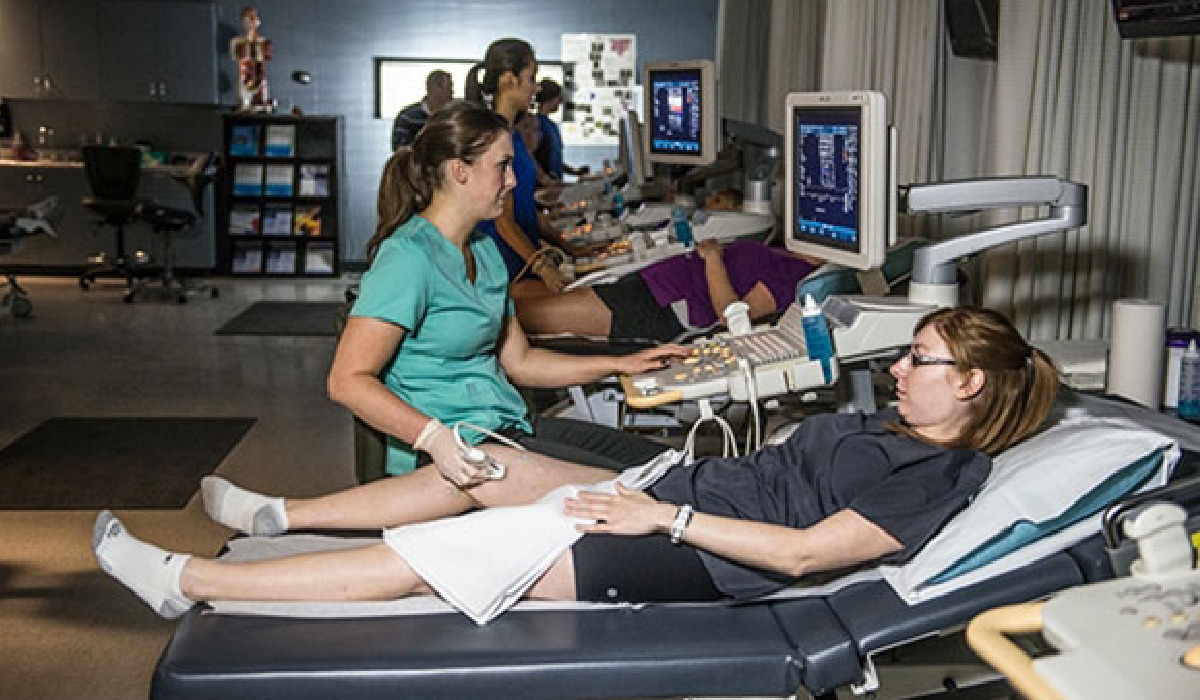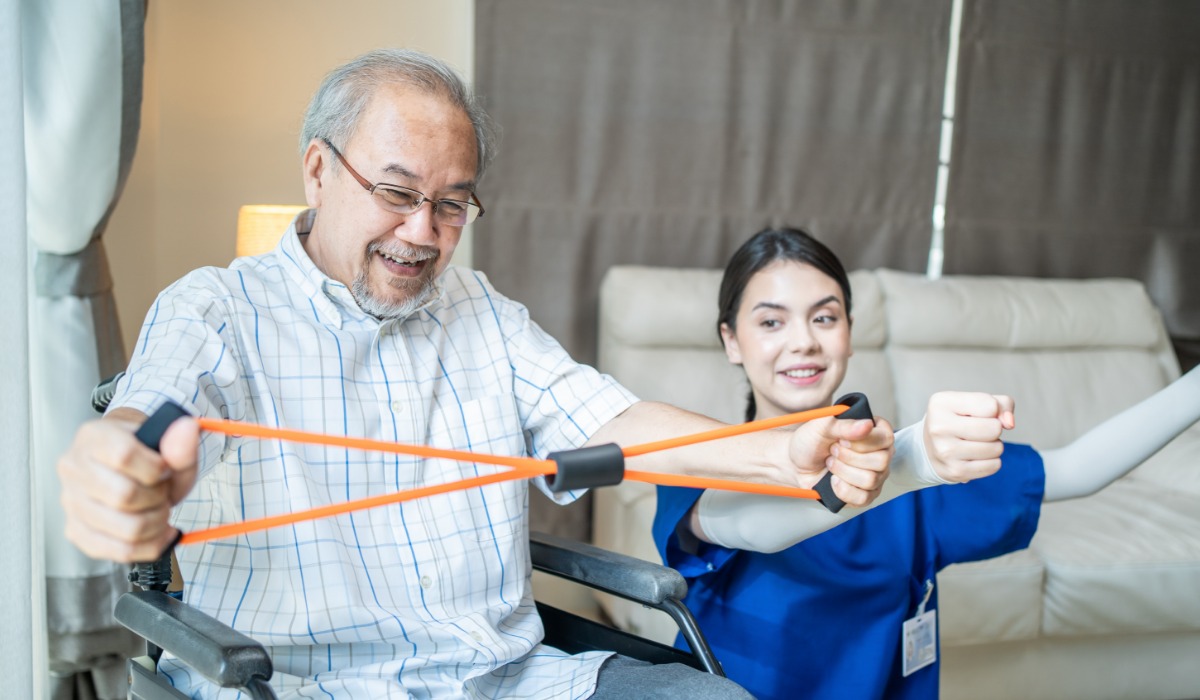Mandatory requirements
Applicants for this program are required to complete the School of Health and Public Safety entrance testing process as an admission requirement for this program by the set deadlines. Review admission requirements for more details.
Overview
Our intensive Respiratory Therapy program trains you to diagnose, treat, and manage cardio-respiratory patients in various medical settings.
This program leverages theory and practical application to equip you with the skills needed for a successful career.
In this program, you will:
- learn life-saving procedures like cardiopulmonary resuscitation and advanced ventilator management
- master oxygen and aerosol therapies to support patient breathing
- develop comprehensive skills in patient evaluation
- gain experience with pulmonary function testing and blood analysis
- engage in simulations that mimic real patient responses in SAIT's Centre for Advanced Patient Care Simulation
- acquire hands-on experience in diverse settings, including ICU, emergency departments and home care environments
- benefit from classroom studies that cover new technologies and best practices in care for the respiratory system.
Embark on a career as a therapist in acute and community care settings, diagnostic labs and beyond. With experience, you can move into education, research, administration or management roles within the healthcare sector.
With a history of training successful graduates since 1970, our program is a beacon for those looking to make an impact in respiratory therapy.
Respiratory therapists tend to be objective, methodical and innovative.
You need:
- effective communication skills
- organization, critical thinking and problem-solving skills
- the ability to tolerate the sight of human blood and tissue
- physical stamina to transport, lift, and position patients and equipment
- compassion and an interest in caring for others
- the ability to act quickly and decisively in a crisis
- the ability to work well under stress, maintain professional behaviour and regulate your emotions
- the ability to work on your own and within a team.
You will need to wear personal protective equipment (PPE) for long periods, which includes exposure to latex and other disinfection materials. You should be comfortable performing patient care procedures in very close proximity to your patients.
Some roles require extended work hours and shift work, including nights and weekends.
You are encouraged to refer to the ALIS website for career, learning, and employment information for respiratory therapists and the National Competency Framework for the profession to ensure you can successfully meet the occupational requirements for the program and profession.
You'll complete practicum rotations in adult, pediatric and neonatal intensive care units, the emergency department, anesthesia, wards, home care, pulmonary function and blood gas labs.
Your shifts may occur at any time of day (including overnights), on weekdays or on weekends. During the program's third-year practicum rotations, you'll spend most of your time in the workplace but will be required to return to SAIT for a short period each semester, regardless of your practicum location.
You will be assigned practicum placements with consideration given to your preference of location. However, due to limited availability in Calgary, you might need to travel or relocate outside the city.
The healthcare field has a strong focus on health, wellness, and fitness to practice due to the demanding nature of the work and Occupational Health and Safety requirements. As such, special considerations will not be granted based on individual circumstances or preferences, except those stated as protected grounds when an accommodation has been approved.
In compliance with the practica agreements with our clinical partners, you will be required to provide specific documentation before you can participate in your practicum. Find out what requirements you need for this program.
In addition to the standard requirements, you'll need to complete the Neonatal Resuscitation Program offered by the Canadian Pediatric Society. Proof of completion must be submitted before your fifth semester. The certification must be valid for the entire practicum year.
Our Respiratory Therapy program is accredited by Accreditation Canada. SAIT works closely with our advisory committee to ensure our curriculum continues to exceed provincial and national accreditation standards.
Graduates must successfully challenge the Health Professionals Testing Canada (HPTC) examination to earn the right to practice respiratory therapy in Canada. Most provinces in Canada also have a provincial regulatory body, which you will need to join to work in that province.
All graduates may become members of the Canadian Society of Respiratory Therapists (CSRT) by paying the membership fee, and this is required to practice in an unregulated province.
If you intend to work in Alberta after graduation and your first language is not English, you will need to meet the English language requirements of the College of Respiratory Therapists of Alberta (CRTA). Other regulators may also have specific language proficiency requirements. Please contact the regulator of the province you wish to work in to determine their specific requirements.
Upon successful completion of this program, you'll be awarded a SAIT Respiratory Therapy diploma.
Careers and opportunities
Each year, SAIT conducts a survey between February and April to determine the employment rate, salary and satisfaction of our newest SAIT alumni.
![]() 100% graduate employment rate
100% graduate employment rate
![]() $81,696 average starting salary
$81,696 average starting salary
Find out more about our graduate employment statistics >
Our graduates may work in the following occupations. Some careers require additional experience and education.
Associated National Occupational Classification (NOC) codes: 32103, 32123, 30010, 41404.
Career planning support
Unsure which career path is for you? Here are some recommended career planning resources to help you decide your future.
You can also head to Alberta alis for lots of information about careers in Alberta, including quizzes and labour market information to help you narrow down a path.
Finally, you can take our online career finder quiz, which can help narrow your options based on your current skills and interests.
Courses
The Respiratory Therapy diploma requires 96 credits (27 courses) to complete.
The program spans three years, with two semesters in the first and second year respectively, and three semesters in the third year.
The program is delivered in a blended format, with courses in theory that may be offered in-person and/or online, as well as face-to-face lab and practicum components.
| Course | Credits |
|---|---|
|
Core concepts vital to respiratory care practice are explored, including medical terminology, infection control, occupational health and safety, computer skills and an introduction to medical research. Corequsites:
|
3 |
|
The main respiratory pathologies encountered by respiratory therapists are addressed with an emphasis on obstructive and restrictive disorders as well as the pharmacological interventions used in disease management. Pre-requisites:
|
3 |
|
Pathophysiology 2 presents the main non-respiratory pathologies encountered by respiratory therapists as well as pathologies relevant for neonatal and pediatric care. Each pathology is investigated with emphasis on the pathophysiology and clinical management of these disorders and the pharmacological treatments used in their management. Pre-requisites:
|
3 |
|
A case-based approach to pathophysiology challenges the learner to apply and integrate knowledge from previous courses to realistic clinical cases with complex presentations. Pre-requisites:
|
1.5 |
|
In this course, patient management skills and clinical competency are developed during a hands-on clinical practicum where learners are engaged in managing real-life situations, under the guidance of a preceptor. Learners are expected to demonstrate professionalism, effective communication, and critical-thinking skills in all practice areas. A focus is placed on reflective practice and continuous self-improvement. Pre-requisites:
Corequsites:
|
6 |
|
In this course, patient management skills and clinical competency are applied during a hands-on clinical practicum where learners use their knowledge, skills, and attitudes to manage real-life situations under the guidance of a preceptor. Learners are expected to demonstrate professionalism, effective communication, and critical-thinking skills in all practice areas. Focus is also placed on reflective practice and continuous self-improvement. Pre-requisites:
Corequsites:
|
6 |
|
In this course, patient management skills and clinical competency are modeled during a hands-on clinical practicum where learners use their knowledge, skills, and attitudes to manage real-life situations to a competent level, under the guidance of a preceptor. Learners are expected to demonstrate professionalism, effective communication, and critical-thinking skills in all practice areas. Focus is also placed on reflective practice and continuous self-improvement. Pre-requisites:
Corequsites:
|
6 |
|
The anatomy and physiology of the human body is explored with an emphasis on the respiratory and cardiovascular systems. Foundational principles are introduced regarding pathology and how structure and function can be affected by disease. Corequsites:
|
3 |
|
Learners will be provided with the opportunity to develop foundational patient assessment skills for lower-acuity patients by using an integrated approach of classroom and lab. Focus will be placed on a complete evaluation of a respiratory patient including interviewing, vital signs, respiratory assessment, basic diagnostics and documentation. Corequsites:
|
3 |
|
This first of four clinical practice courses is designed to guide learners through the practicum experience and clinical practice. The history and background of the profession of respiratory therapy will be discussed. An introduction will also be provided on learning strategies, ethics, conflict management, professionalism and the preceptor model of education. A case-based exam and evaluative clinical scenario will be completed at the end of the course. Corequsites:
|
3 |
|
Through lab and classroom learning, the fundamentals of chemistry and physics are applied to the field of respiratory care with an emphasis on medical gases, humidity and aerosol therapy as well as oxygen therapy, sources and delivery systems. Corequsites:
|
3 |
|
Through a combination of lab and classroom learning, basic respiratory therapy patient assessment techniques are introduced and include hemodynamic monitoring, monitoring of other body systems and advanced diagnostics such as arterial blood gases and non-invasive respiratory monitoring. Focus will be on the overall assessment of a moderate- to high-acuity patient. Pre-requisites:
|
3 |
|
Learners will be guided through the practicum experience and prepared for clinical practice in this second of four clinical practice courses which involves classroom instruction and clinical simulation. Topics include the history of respiratory therapy, ethical issues, death and dying, adverse medical events and conflict resolution. A case-based exam and evaluative clinical scenario will be completed at the end of the course. Pre-requisites:
|
3 |
|
Lab-based learning and classroom theory are blended to introduce foundational knowledge and skills in basic patient interventions, including airway management, bronchopulmonary hygiene, medication administration and mechanical ventilation of the adult patient. Emphasis is placed on integration of safe practices, infection control principles and critical thinking into the performance of patient interventions. Pre-requisites:
|
6 |
|
In Anesthesia, concepts regarding the fundamentals of anesthetic procedures, pharmacology, equipment and patient safety and the role of the respiratory therapist in the operating room are examined. Pre-requisites:
|
1.5 |
|
Patient Assessment 3 is a combination of practical and classroom learning where learners expand their patient evaluation skills to include advanced assessment on neonatal, pediatric and adult patient populations. Learners will be challenged to fully assess all patient populations, at all levels of acuity, including end-of-life scenarios. Pre-requisites:
|
3 |
|
This course is the third of four clinical practice courses which prepares learners for clinical practice. Topics include working within an interdisciplinary team, leadership skills, crisis management and the role of reflection and self-assessment. There is also a neonatal resuscitation component which focuses on assessments and interventions. Pre-requisites:
|
3 |
|
Lab-based learning and classroom theory are blended to provide opportunities for developing knowledge and skills in patient interventions including airway management, ventilator management and other patient care procedures. Background skills and knowledge are expanded to all patient populations with continued emphasis on safe patient care, infection control practices and critical thinking. Pre-requisites:
|
6 |
|
Concepts of pulmonary diagnostic procedures, pulmonary rehabilitation, community care, discharge planning and smoking cessation will be highlighted through a blend of lab and classroom learning. The lab has a large focus on the performance of pulmonary function testing and interacting with patients. Pre-requisites:
|
3 |
|
This course is the final of four courses in which the learner is increasingly prepared for a supervised clinical experience. Classroom instruction and simulation are used to emphasize an evidence-based approach to patient care, patient-centered care and preceptor and debriefing skills. The course culminates with a case-based exam and evaluative clinical scenario. Pre-requisites:
|
3 |
|
Lab-based learning and classroom theory are blended to further advance knowledge and skills in the management of critically ill and unstable patients. Advanced mechanical ventilation strategies including high-frequency ventilation, advanced airway techniques, difficult airway management and higher level patient care procedures are explored. Pre-requisites:
|
6 |
|
Using individualized learning packages designed to support specific semester five clinical rotations, the learner re-examines previous content and applies it to his/her practice. Each package provides a variety of assessments, tools and resources to assist in the transition of classroom knowledge into clinical proficiency. Pre-requisites:
Corequsites:
|
3 |
|
Practicum Foundations 1 combines on-line and intense on-campus preparation for the first of three practicum placements. Learners will apply foundational skills and theory in clinical simulation and laboratory environments. This course culminates with the creation of individualized learning plans designed to ensure success during practicum. Pre-requisites:
|
3 |
|
In this course, learners use individualized learning packages designed to support specific clinical rotations which helps them re-examine previous content and apply it to their semester six practice. Each package provides a variety of assessments, tools, and resources to assist in the transition of classroom knowledge into clinical proficiency. Pre-requisites:
Corequsites:
|
3 |
|
Practicum Foundations 2 combines on-line and intense on-campus preparation for the second of three practicum placements. Focus will be placed upon current trends in respiratory care, pediatric and neonatal care and the refining of foundational skills in clinical simulation and laboratory environments. Attention will also be placed on the modification of individualized learning plans designed to enhance personal practice. Pre-requisites:
|
3 |
|
In this course, learners use individualized learning packages designed to support specific clinical rotations which help them re-examine and apply material covered to-date to their semester seven practice. Each package provides a variety of assessments, tools, and resources to assist in the transition of classroom knowledge into clinical practice. Pre-requisites:
Corequsites:
|
3 |
|
Entry to Professional Practice is designed to prepare learners for the national credentialing exam and employment. Exam results are used to refine individualized learning plans to ensure continued success in the field of respiratory therapy. The culmination of this course will involve a major project and a comprehensive exam. Pre-requisites:
|
3 |
Progression
You must attain a PGPA and/or a CGPA of 2.0 or better each semester and pass the prerequisite courses to progress through the program.
To qualify for graduation, you must pass all courses, attain a CGPA of 2.0 or better and complete course requirements within the prescribed timelines.
Admission requirements
Applicants educated in Canada
Applicants must demonstrate English language proficiency and meet the following requirements or equivalents:
- at least 70% in Math 30-1 or at least 75% in Math 30-2, and
- at least 70% in English Language Arts 30-1, and
- at least 70% in Chemistry 30, and
- at least 70% in Biology 30.
You must also achieve at least 50% in the School of Health and Public Safety's entrance testing process.
SAIT accepts high school course equivalents for admission for applicants educated outside Alberta.
All applicants who were educated outside of Canada must demonstrate English language proficiency and provide proof they meet the program admission requirements outlined above with an international document assessment. Find accepted educational documents and assessment options.
SAIT may also accept courses completed at certain international post-secondary institutions.
Academic Upgrading
Missing an admission requirement for this program? Upgrade your prior education to help you receive admission into one of SAIT's career programs.
English language proficiency
All applicants must demonstrate English language proficiency prior to admission, including students educated in Canada.
Transfer agreements
At SAIT, we have created transfer agreements with partner institutions to allow you to earn course credits toward your SAIT program based on your previously completed credentials.
Transfer Alberta search tool
Use the Transfer Alberta search tool to see all transfer agreements between Alberta post-secondary institutions (including those with the University of Calgary, Mount Royal University and Bow Valley College.)
Search transfer agreements in Alberta
Transfer options for graduates
When you have completed this program, you may continue your education at a partner post-secondary institution. These transfer agreements include partnerships within and/or outside of Canada.
Credits this program transfers to
- Available credits:
- 84
Upon successful completion of this program, you can ladder into the third year of TRU's Open Learning Bachelor of Health Science program, provided you meet the admission requirements.
Available intakes
Fall 2026
Start dates:
- Domestic students: Open
-
-
Application deadline: March 31, 2026
-
- International students: Open
-
-
Application deadline: May 29, 2026
-
Costs
2025/26 tuition and fees
The following estimated costs are effective as of July 1, 2025.
The estimated total cost of tuition and fees is based on the suggested schedule of study. Following a modified schedule will impact the fees you pay per semester and may alter final costs.
Domestic students
*You will be ineligible for the UPass during your third year.
The program total is based on the estimated amount you will pay if you enter this program during the 2025/26 academic year. The program total amount listed on your letter of admission may appear higher. This amount is your maximum tuition guarantee for the program. SAIT will not exceed this maximum, regardless of changes in tuition and fees between academic years.
*You will be ineligible for the UPass during your third year.
Books and supplies are approximately $2,500 per full-time year.
Books, Laptops and Computers
This is a bring-your-own-device program with a standard computer hardware and software requirement. See the specific requirements on our computers and laptops page.
A device that supports LockDown Browser and Respondus Monitor and is equipped with a microphone and camera is also required to access program assessments.
Find your booklist on the SAIT Bookstore's website. Booklists are by semester and made available approximately two weeks before classes begin.
Lab Supply Kit
- Pay for a Lab Supply Kit at the SAIT Bookstore.
- Bring your receipt to the appropriate instructor, who will provide you with your Lab Kit in exchange for proof of payment.
Personal Protective Equipment (PPE) and Uniform
You will need your uniform for orientation day, so order your uniform early. You are expected to wear scrubs for all simulated labs, including the Centre for Advanced Patient Care Simulation, and at clinical/practicum. Only specific styles and colours of scrubs are approved for this program.
Approved scrubs can be purchased at Universal Workwear.
Stethoscopes
- A stethoscope is part of your uniform and is also available at Universal Workwear.
- Stethoscopes need to be brought to all patient assessment labs and simulation labs.
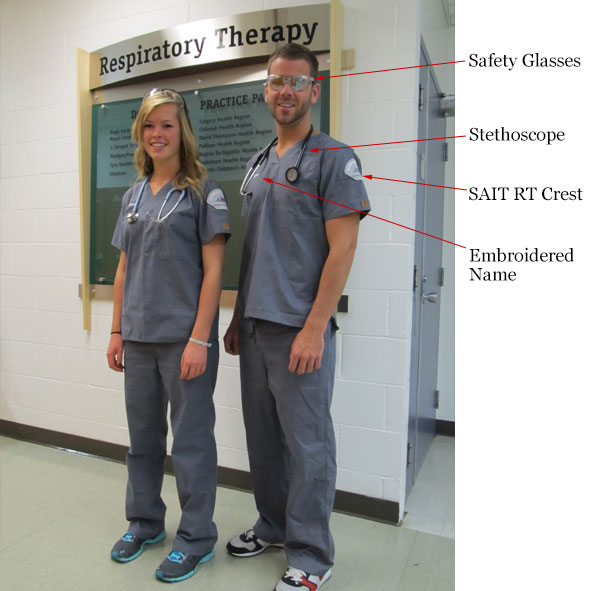
Students Outside of Calgary
If you live outside the Calgary area, you have two options to purchase your uniform:
- Wait until you move to Calgary to order your uniform in person so that you can try on the tops before your name is embroidered and SAIT crest is added. If you choose this option, please allow yourself at least two to three days for Universal Workwear to have it ready for pick-up, as you must wear your uniform to Orientation.
- Find a local scrub provider who carries the MOBB brand of scrubs, and try them on for fit. Then, place your order by calling Universal Workwear at 1.866.442.7303 (toll-free) so they may have your uniform ready for you once you arrive in Calgary. If you use this option, please review the photo of your uniform to know what to look for.
Additional Fees
- A fee of $375 is associated with the CompTracker application used in this program.
- A fee of $200 (USD) is associated with the EHR Go application used in this program.
- A fee is associated with obtaining a police information check, including a vulnerable sector check, payable to the police or the Royal Canadian Mounted Police (
Financial aid
Paying for your education may feel overwhelming, but we have resources and programs that can help, including information about payment options, student loans, grants and scholarships.
Application process
Before applying to this program, you must complete the necessary entrance tests.
Refer to Health and Public Safety entrance testing to find the required tests and deadlines and instructions on how to book your exams.
Ready to apply?
Follow our step-by-step guide to submitting a successful application.
Communication during admission
Email is the primary source of communication during the admission process. Ensure your personal email account is managed appropriately to receive our emails, files and communications.
We recommend you add hps.info@sait.ca domain to your safe senders' list or you risk missing critical email messages.
Begin your application
Apply now using the online application portal.
Ensure you have a valid Visa or Mastercard to pay the non-refundable application fee of $120 for domestic applicants or $175 for international applicants.
Information sessions
Prepare for a strong start in your chosen program or get the details you need to decide your future path.
Our expert staff and faculty are ready to answer your questions and provide information about the following:
- What sets SAIT apart
- An introduction to the program and area of study
- Admission requirements
- Future career paths
- Information on the earning potential and graduate employment rates.
Contact us
School of Health and Public Safety Advising
-
Email - hps.info@sait.ca
International Student Advising
-
Phone - 403.284.8852
-
Email - international@sait.ca
Subscribe for updates
Your journey starts here! Sign up to get important updates on:
- Health and medical programs
- Application information
- Relevant news and events

Oki, Âba wathtech, Danit'ada, Tawnshi, Hello.
SAIT is located on the traditional territories of the Niitsitapi (Blackfoot) and the people of Treaty 7 which includes the Siksika, the Piikani, the Kainai, the Tsuut’ina and the Îyârhe Nakoda of Bearspaw, Chiniki and Goodstoney.
We are situated in an area the Blackfoot tribes traditionally called Moh’kinsstis, where the Bow River meets the Elbow River. We now call it the city of Calgary, which is also home to the Métis Nation of Alberta.
